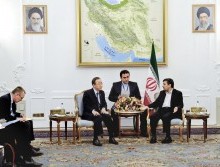
The Iran nuclear talks took a strikingly disappointing turn last week and now the question in Israel and the United States is what’s next if an agreement is not reached soon. For the US, that mean’s getting ready for what may happen if the nuclear deal that swapped sanctions relief to Iran in exchange for restrictions on Tehran’s nuclear program—known as the Joint Comprehensive Plan of Action (JCPOA)—isn’t revived at all.
“Iran did not show seriousness. Iran did not show the posture of a country that is seriously thinking of a rapid return to mutual compliance,” a senior US State Department told reporters on Saturday. “…We are looking at that and we’re not standing still, even now; we’re making our decision. We’re obviously preparing for a world in which there is no return to the JCPOA. It is not our preference.”
While the US senior official was intentionally vague on how the US might respond—with expanded sanctions sounding like the primary option—Israel told the US that for them that they are thinking more broadly—presumably including a military option. Speaking to new US Ambassador to Israel Tom Nides on Sunday, Israeli President Isaac Herzog was quoted by an Israeli press release as saying, “Israel will welcome a comprehensive, diplomatic solution which permanently solves the Iranian nuclear threat.
“In the case of a failure to achieve such solution, Israel is keeping all options on the table and it must be said that if the international community does not take a vigorous stance on this issue—Israel will do so. Israel will protect itself.”
The US senior official—whose comments on Saturday were published by the State Department—acknowledged that Israel and the US have differences on Iran and they are aiming to work together, but that Israel would protect itself. “We don’t view our job as trying to calm Israel down. I mean, we share the same sense of urgency, the same alarm at what we’re seeing. Our job as not to stop them… our job, our goal is to try to align our policies as much as possible because we know we share a common objective, and we think that we could be more effective when we work together,” said the official. “But at the end of the day, Israel has its national interests that it will defend.”
The US official expressed deep disappointment with how the latest talks with Iran had gone, saying Iran walked back their own proposed compromises from prior negotiating rounds and sought to not only lift the sanctions re-imposed by the US when the Americans withdrew from the JCPOA in 2018, but to demand relief that goes “well beyond the scope of the JCPOA.”
The US official said the result of prior talks wasn’t “our ideal. We had to make some compromises and Iran had to make some compromises. But for Iran to take that as a starting point and then say now what we’re going to do is try to improve on everything to our benefit—and asking for more and giving less—in terms of our nuclear program, that’s not a serious way to negotiate.”
The US official indicated that even the Russians and Chinese, allies of Iran, were showing impatience with Iran and reiterated the US view that time was running out for a return to the original JCPOA because Iran’s nuclear technological advances would make that deal irrelevant.
To that end, the US official said they would not seek to “divine” Iran’s motives on whether or not the nuclear advances were just to strengthen their negotiating position—what Israel has called “nuclear blackmail”—or to advance to the nuclear weapons threshold. “The fact that they are skirting [a simple return to the JCPOA] and continuing to accelerate their program could only lead to the conclusion that they are trying to build a nuclear program for tactical reasons or for more nefarious purposes,” said the official. “But both of those are things that we can’t allow.”
Israel too has concerns about how long the talks are taking and the nuclear progress Iran is making in the meantime. Prime Minister Naftali Bennett on Sunday, in comments released by his office, urged the world to respond to Iran.
“The Iranians, as expected, are proficient negotiators. They backtracked from previous agreements and came with a very strong and thuggish approach,” said Bennett, noting Iran’s latest expansion of nuclear fuel enrichment as an example of the “nuclear blackmail.”
Said Bennett. “I call on every country negotiating with Iran in Vienna to take a strong line and make it clear to Iran that it is impossible to negotiate and enrich uranium at the same time… Iran must start paying for its violations.”
The Israeli leader said Iran’s goal is to lift sanctions so they have “the ability to do what they are doing now regarding terrorism and in the nuclear sphere, only this time they want to be strengthened by tens of billions of dollars and a tailwind for all of their activity.”
Israel, according to Bennett, is having “intensive dialogue” with the US, United Kingdom, France, Russia and more, including visits this week to the US by Defense Minister Benny Gantz and Mossad Director David Barnea.
“Our goal is to utilize the window of opportunity that has opened between the rounds in order to tell our friends in the US: This is precisely the time to use a different toolkit against Iran’s galloping forward in the enrichment sphere,” said Bennett.
In the meantime, the US official on Saturday said that the Americans can add sanctions on Iran during the negotiations as Iran stonewalls.
“You’ll see that we are prepared to both engage in diplomacy but also use other tools when necessary if Iran is not prepared to come back to a mutual return to compliance, which, again, is our objective, is our priority,” said the official. “And I think if they are serious in getting there, they’ll see that we are serious as well.”
(By Joshua Spurlock, www.themideastupdate.com, December 5, 2021)
